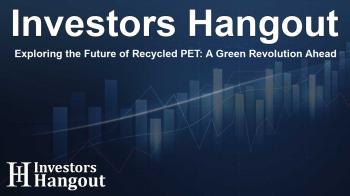Exploring the Future of Recycled PET: A Green Revolution Ahead

Recycled PET: A Growing Market with Environmental Implications
The global recycled polyethylene terephthalate (rPET) market is on a robust growth trajectory, with figures projected to jump from USD 12.76 billion to an impressive USD 26.78 billion by 2034. This transformation, as outlined by recent industry insights, is largely driven by increased environmental consciousness and strict government regulations aimed at enhancing plastic recycling efforts. As more industries embrace sustainability, the demand for rPET is rapidly evolving.
The Push for Sustainable Packaging Solutions
In today's marketplace, businesses within the food and beverage, personal care, and textile sectors are realizing the benefits of using recycled PET. Not only is rPET cost-effective, but it significantly reduces their carbon footprint. Many companies are now prioritizing eco-friendly and recyclable materials, which aligns with the growing consumer preference for sustainable products.
Technological Advancements in Recycling
Innovations in recycling technologies like mechanical and chemical processes are crucial for enhancing rPET's quality. These advancements are expanding the application range for rPET products, making them increasingly desirable as companies look to meet the rising demand for sustainable packaging solutions.
The Concept of Circular Economies
The transition to a circular economy, where waste is minimized, and materials are reused, is central to the rPET narrative. Corporate initiatives and partnerships focused on sustainable practices bolster the momentum for rPET usage, helping to create a streamlined process that intertwines ecological responsibility with profitable business strategies.
What Is Recycled Polyethylene Terephthalate (rPET)?
rPET is derived from recycled PET products, such as beverage bottles and containers. The recycling process involves collecting these items and converting them into new rPET, which retains many of the properties of virgin PET, including durability and clarity. This not only reduces waste but also alleviates the reliance on new, virgin plastics.
Latest Trends Shaping the rPET Market
As the rPET sector evolves, several key trends are emerging:
- Tightening regulations: Governments are enforcing stricter mandates on recycled content, compelling brands to adapt or face penalties.
- Price competition: While virgin PET remains cheaper, efforts to scale up rPET production methods aim to balance this disparity.
- Quality issues: Contamination from waste streams poses a challenge, particularly in food-grade packaging applications, necessitating improved recycling practices.
- Research and Development: Investment in R&D for chemical recycling innovations is crucial to address quality limitations.
- Micro-recycling facilities: The demand for decentralized processing hubs aims to enhance feedstock purity and accessibility.
Regional Insights into the rPET Market
Globally, the rPET landscape is characterized by different regional nuances. For instance, the Asia Pacific region is leading due to rapid urbanization and a rise in packaged goods consumption. Countries like China and India have established substantial recycling infrastructures, spurred on by government-backed initiatives aimed at reducing plastic waste.
Market Dynamics in North America
In North America, a notable shift is occurring with strong regulatory support and increased consumer dedication to sustainability. Major corporations, particularly in the food and beverage sector, are increasing their usage of rPET, aligning with both consumer expectations and environmental regulations.
Market Growth in Europe
The European market is witnessing significant expansion driven by stringent environmental regulations. Initiatives from the EU, including directives on plastic recycling, are fostering robust growth in rPET usage. Brands across the continent are setting ambitious sustainability targets, making rPET a vital component in achieving these objectives.
Challenges Facing the rPET Industry
Despite the advancements and positive trends, the rPET market faces several challenges, including the limited availability of high-quality recyclables and competition from cheaper virgin PET. Addressing these challenges will require coordinated efforts from governments, industry players, and consumers alike.
Frequently Asked Questions
What is the projected growth of the rPET market?
The rPET market is expected to grow from USD 12.76 billion in 2025 to USD 26.78 billion by 2034.
Why is rPET important for sustainability?
rPET reduces plastic waste and reliance on new plastic production, supporting environmental sustainability goals.
How does rPET compare to virgin PET?
rPET maintains similar functionality as virgin PET but significantly lessens environmental impact and plastic waste.
What are the main challenges in the rPET market?
Challenges include competition from cheaper virgin PET, contamination in the recycling process, and limited quality feedstock.
Which regions are leading in rPET production?
Asia Pacific leads in rPET production, with significant contributions from North America and Europe due to regulatory support.
About The Author
Contact Owen Jenkins privately here. Or send an email with ATTN: Owen Jenkins as the subject to contact@investorshangout.com.
About Investors Hangout
Investors Hangout is a leading online stock forum for financial discussion and learning, offering a wide range of free tools and resources. It draws in traders of all levels, who exchange market knowledge, investigate trading tactics, and keep an eye on industry developments in real time. Featuring financial articles, stock message boards, quotes, charts, company profiles, and live news updates. Through cooperative learning and a wealth of informational resources, it helps users from novices creating their first portfolios to experts honing their techniques. Join Investors Hangout today: https://investorshangout.com/
The content of this article is based on factual, publicly available information and does not represent legal, financial, or investment advice. Investors Hangout does not offer financial advice, and the author is not a licensed financial advisor. Consult a qualified advisor before making any financial or investment decisions based on this article. This article should not be considered advice to purchase, sell, or hold any securities or other investments. If any of the material provided here is inaccurate, please contact us for corrections.

